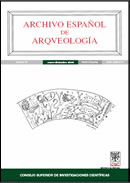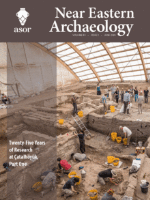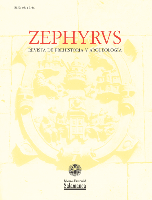
Rossiiskaya Arkheologiya
Scope & Guideline
Connecting Researchers to the Foundations of Civilization
Introduction
Aims and Scopes
- Archaeological Methodologies:
The journal employs a variety of methodologies including excavation reports, stratigraphic analysis, and radiocarbon dating to provide detailed insights into past human activities. - Cultural Heritage Studies:
Rossiiskaya Arkheologiya examines the cultural artifacts, burial practices, and settlement patterns of ancient populations, contributing to the understanding of cultural evolution and interactions. - Interdisciplinary Research:
The journal encourages interdisciplinary studies that incorporate genetics, paleoenvironmental data, and technological analyses, thus broadening the scope of archaeological research. - Regional Focus:
There is a consistent focus on the archaeology of Eastern Europe, the Caucasus, and Central Asia, exploring the historical contexts of these regions from prehistoric times to the medieval period. - Technological Advances in Archaeology:
The journal highlights advancements in archaeological technologies, such as 3D modeling, geoarchaeology, and archaeometallurgy, which enhance the analysis and interpretation of archaeological findings.
Trending and Emerging
- Bioarchaeology and Genetic Studies:
There is an increasing emphasis on bioarchaeology, including genetic studies of ancient populations. This trend showcases a growing interest in understanding human mobility, health, and demographic changes over time. - Environmental Archaeology:
Research focusing on the interactions between human societies and their environments is gaining traction. This includes studies on climate impacts, resource usage, and landscape modifications in archaeological contexts. - Technological Integration in Archaeology:
The use of advanced technologies such as 3D modeling, GIS, and digital archaeology is emerging as a prominent theme, enhancing data visualization and analysis in archaeological research. - Cultural Exchange and Interaction Studies:
There is a notable trend towards exploring cultural interactions between different groups, including trade, migration, and the diffusion of technologies, which enriches the understanding of historical processes. - Archaeological Heritage Management:
The journal is increasingly addressing themes related to archaeological heritage management, including preservation strategies and the role of archaeology in contemporary society, reflecting a commitment to public engagement and sustainability.
Declining or Waning
- Traditional Artifact Studies:
There has been a noticeable decrease in papers focusing solely on traditional artifact studies without integrating modern methodologies or interdisciplinary approaches. This indicates a shift towards more holistic research. - Historical Narrative Focus:
Research that primarily emphasizes historical narratives without archaeological evidence has diminished, as the journal increasingly values empirical data and cross-disciplinary validation. - Local Case Studies:
While local case studies were once prevalent, there is now a trend moving towards broader regional analyses, potentially limiting the publication of highly localized archaeological findings. - Classical Archaeology:
Papers centered on classical archaeology, particularly those focused on Greco-Roman contexts, have become less frequent, possibly overshadowed by a growing emphasis on prehistoric and early medieval studies.
Similar Journals

Studijne Zvesti Archeologickeho Ustavu Slovenskej Akademie Vied
Fostering interdisciplinary dialogue in the field of archaeology.Studijne Zvesti Archeologickeho Ustavu Slovenskej Akademie Vied is a leading journal in the field of archaeology, published by the SLOVENSKA AKAD VIED, ARCHEOLOGICKY USTAV, based in Nitra, Slovakia. This esteemed journal, with the ISSN 0560-2793, has established itself as a vital resource for scholars and researchers, reflecting significant academic contributions in both the arts and humanities as well as social sciences. With a 2023 Scopus ranking placing it in the second quartile (Q2) for archaeology, it showcases rigorous research and innovative methodologies, essential for advancing archaeological studies. While it is not an Open Access journal, it continues to offer valuable insights into archaeological findings, theoretical frameworks, and interdisciplinary approaches. The journal serves as a bridge, connecting local Slovak archaeology with international discourse, making it an indispensable tool for students, professionals, and academics striving for a deeper understanding of the archaeological heritage of Slovakia and beyond.

Egyptian Journal of Archaeological and Restoration Studies
Preserving Heritage, Shaping Scholarship.Welcome to the Egyptian Journal of Archaeological and Restoration Studies, a vital resource for scholars and practitioners in the field of archaeology and restoration. Published by the renowned SOHAG UNIV PUBLICATION CENTER-SUPC, this journal aims to disseminate cutting-edge research that illuminates the rich archaeological heritage of Egypt and beyond. With ISSN 2090-4932 and E-ISSN 2090-4940, this journal showcases innovative methodologies and interdisciplinary approaches, significantly contributing to our understanding of cultural heritage preservation. The journal's growing influence is reflected in its Q3 ranking in multiple categories, including Archaeology, Conservation, and Cultural Studies as of 2023, alongside its noteworthy placement within the Social Sciences. Open access options provide wider accessibility to essential studies, making it an indispensable tool for researchers, professionals, and students alike. Join us in exploring the past and shaping the future of archaeological scholarship.

Archivo Espanol de Arqueologia
Unveiling the past with rigorous research and innovative methodologies.Archivo Español de Arqueología is a prestigious journal published by the Consejo Superior de Investigaciones Científicas (CSIC), dedicated to the field of archaeology and the historical sciences. Since its transition to Open Access in 1991, this journal has been a significant resource for scholars and practitioners in Spain and beyond, ensuring the dissemination of high-quality research to a broad audience. With an impressive Scopus ranking that places it within the top 20% of journals in the disciplines of History and Archaeology, Archivo Español de Arqueología plays a crucial role in advancing academic discourse and promoting innovative archaeological methodologies. The journal has maintained rigorous standards, reflected in its placement within the Q2 and Q3 quartiles, enabling it to establish a reputation for excellence and reliability in archaeological scholarship. Researchers, professionals, and students are encouraged to explore the journal's diverse array of articles from its foundation year of 2009 to the present, enriching their understanding of the past through the latest findings and theoretical advancements in archaeology.

Annales Instituti Archaeologici
Bridging the Gap Between Past Discoveries and Future InnovationsAnnales Instituti Archaeologici is a distinguished journal published by INST ARHEOLOGIJU, dedicated to advancing research in the field of archaeology. With an ISSN of 1845-4046 and an E-ISSN of 1848-6363, this journal serves as a vital platform for the dissemination of innovative archaeological studies and findings, reflecting the evolving trends and methodologies in this fascinating discipline. Based in Croatia, the journal captures a global audience, emphasized by its Q3 ranking in both Archaeology categories as per the latest 2023 metrics, indicating a solid presence in the academic landscape. Although it does not currently offer Open Access options, its impactful contributions are recognized through its Scopus ranks, where it stands at #137/413 in Archaeology related to Arts and Humanities and #135/354 in Social Sciences. Researchers, professionals, and students interested in the latest archaeological research and its applications will find Annales Instituti Archaeologici to be an invaluable resource, promoting knowledge and fostering scholarly communication within the archaeological community.

Kratkie Soobshcheniya Instituta Arkheologii
Illuminating the Path of Historical InquiryKratkie Soobshcheniya Instituta Arkheologii is a prestigious academic journal published by IZDATELSTVO NAUKA, specializing in the fields of archaeology and history. With an ISSN of 0130-2620, this journal has established itself as a vital resource for scholars, researchers, and students engaged in the humanities, particularly within the Russian Federation. Recognized for its high-quality contributions, it has achieved a remarkable Q1 ranking in both Archaeology and History for the year 2023, demonstrating its significant impact and relevance in these disciplines. Although it does not provide open access, the journal's robust positioning in Scopus — ranking #634 in History and #208 in Archaeology — further attests to its scholarly authority and the insightful research it disseminates. The journal covers a comprehensive range of topics, facilitating a deeper understanding of archaeological practices and historical methodologies, thereby fostering academic dialogue and knowledge advancement from 2018 through 2024. Addressing an international audience of professionals and students alike, Kratkie Soobshcheniya stands as a cornerstone for innovative research in archaeology and history.

NEAR EASTERN ARCHAEOLOGY
Pioneering Insights into Archaeology and HistoryNEAR EASTERN ARCHAEOLOGY, published by University of Chicago Press, is a premier journal dedicated to the field of archaeology, particularly focusing on the rich cultural heritage and archaeological findings of the Near East. With an ISSN of 1094-2076 and an E-ISSN of 2325-5404, this esteemed publication provides a vital platform for scholars and practitioners to share their research, insights, and discoveries. The journal holds an impressive ranking in the Q1 quartile for both Archaeology and History in 2023, reflecting its significant impact within these fields and a robust history of scholarly contribution. The journal has been pivotal in shaping discussions around archaeological methodology, theory, and contemporary issues from 2002 to 2024, as it continues to reach a wide audience through various access options. With Scopus rankings placing it in the top percentiles for both History and Archaeology, NEAR EASTERN ARCHAEOLOGY represents an essential resource for researchers, professionals, and students alike, fostering the exploration and understanding of the region's archaeological narrative.

Cuadernos de Prehistoria y Arqueologia-Universidad Autonoma de Madrid
Elevating Scholarly Excellence in Prehistoric InquiryCuadernos de Prehistoria y Arqueologia-Universidad Autonoma de Madrid is a distinguished academic journal dedicated to the fields of archaeology and prehistory, published by the Universidad Autonoma de Madrid, Departamento de Prehistoria y Arqueología. With an ISSN of 0211-1608, this journal plays a crucial role in disseminating significant research findings and theoretical advancements within these domains. Recognized for its scholarly excellence, it holds impressive quartile rankings in 2023, including Q2 in Archaeology and Q1 in History, reflecting its high impact within the academic community. While currently not an open-access publication, Cuadernos de Prehistoria y Arqueologia provides valuable insights to researchers, professionals, and students engaged in the exploration of human history and cultural heritage from 2018 to 2024 and beyond. With a commitment to fostering interdisciplinary dialogue, this journal serves as an essential platform for innovative studies and comprehensive reviews, contributing to the advancement of knowledge in archaeology and prehistory.

Archeologicke Rozhledy
Unveiling the past through innovative research and dialogue.Archeologicke Rozhledy, published by the Academy of Sciences of the Czech Republic, Institute of Archaeology, is a pivotal open-access journal dedicated to advancing the field of archaeology. Since transitioning to open access in 2019, it has made significant strides in disseminating high-quality research, serving as a vital resource for researchers, professionals, and students alike. With an ISSN of 0323-1267, the journal has gained recognition for its contributions in the domains of arts and humanities, particularly archaeology, as evidenced by its 2023 Q2 ranking in both categories. Operating out of the historical city of Prague, the journal encompasses a broad scope of archaeological scholarship, reflecting a commitment to interdisciplinary approaches and fostering dialogue within the global archaeological community. With its notable Scopus rankings—#115/413 in Arts and Humanities and #113/354 in Social Sciences—Archeologicke Rozhledy stands as a crucial outlet for innovative research and scholarly exchange.

Zephyrus-Revista de Prehistoria y Arqueologia
Connecting Scholars to the Rich Tapestry of Prehistoric LifeZephyrus-Revista de Prehistoria y Arqueologia, published by UNIV SALAMANCA, EDICIONES, is a renowned academic journal dedicated to the fields of archaeology and prehistory. Since its inception in 1950, the journal has embraced an Open Access model, facilitating widespread access to cutting-edge research and scholarly discourse while fostering global collaboration among researchers. Based in Salamanca, Spain, this journal has achieved remarkable recognition, evidenced by its Q1 rankings in Archaeology and History as of 2023, and impressive Scopus standings across various categories, including an 83rd percentile in History. The journal's comprehensive scope since 2011 has made it a vital resource for academics seeking to deepen their understanding of human history through archaeological insights. Zephyrus not only provides a platform for disseminating innovative research findings but also serves as a bridge between historical scholarship and contemporary archaeological practices, ensuring that researchers, professionals, and students alike have access to the latest developments in the field.

ARCHAEOLOGY
Unearthing Insights, Shaping UnderstandingARCHAEOLOGY is a distinguished peer-reviewed journal published by the Archaeological Institute of America, focusing on the multifaceted aspects of archaeological research and its relevance to contemporary society. Established in 1966, this journal serves as a critical platform for scholarly discourse in the field, showcasing innovative findings, theoretical advancements, and methodological discussions related to archaeology. While it maintains a Q4 ranking within the disciplines of archaeology and arts and humanities, its contributions remain valuable for those engaging in archaeological studies or seeking to understand historical and cultural narratives. The journal is accessible in print, with an ISSN of 0003-8113 and an E-ISSN of 1943-5746, ensuring that a wide audience can benefit from its insights. Although currently not classified as Open Access, the meticulous peer-review process ensures a high standard of academic rigor, making it an essential source for researchers, professionals, and students alike who are dedicated to exploring the past through archaeological lenses.